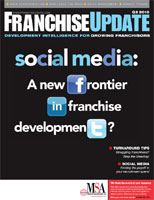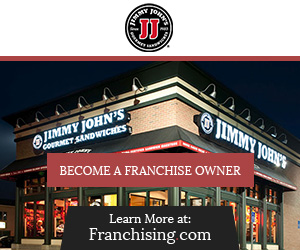Let Go To Grow: Delegating to Area Reps Speeds Expansion
Most franchise concepts are built around the personality of the founder. Entrepreneurial lore is filled with stories of founders who open a business, incubate it for years, and after much trial and error, create a successful business.
This is where these rags-to-riches stories often end. Many entrepreneurial founders never make the transition from a successful single-location operation to a scalable business enterprise because of the Entrepreneurial Founder Paradox.
- It's not all about me. The route to Super Bowl 2011 officially begins in August 2010 and ends in February 2011. However, the assemblage of a Super Bowl winner begins years before the first game of the season is played. Not only is the roster of players important in winning the Super Bowl, the entire organization must work in unison.
From Vince Lombardi of the Green Bay Packers to Sean Payton, coach of the 2010 Super Bowl Champion New Orleans Saints, the team members figured out that it's not all about them--it's about how to leverage the skill set of the organization and the players. Coaches create the strategy and those they recruit execute the tactics of that strategy. Coach Payton gave up a lot of control to those around him, and by doing so he allowed the Saints to win their first Super Bowl. - Gaining control by giving up control. Entrepreneurs need to leverage their skills by doing something that is totally counterintuitive to their core personality: letting go. Ironically, what makes entrepreneurs the essence of the business they create is often the biggest hurdle in growing the business--the desire for absolute control. Letting go of this level of control is actually the first step to gaining control and increasing the ability to scale up an organization. Being unable to replicate a business because of maintaining too much control is a fatal entrepreneurial flaw.
- Financing expansion. Making the transition from a small business to a franchise business is an expensive proposition. The cost of properly launching a franchise business can run into the hundreds of thousands of dollars.
Methods by which a founder-entrepreneur finances the transition from a single-location business to becoming a franchisor may include a personal equity investment, investing internal cash flow, and area representation. A personal investment is not always viable. Growth capital from internally generated cash flow is often too little, too late and can cause windows of opportunity to be missed. Area representation is often the best way to fund the hyper-growth of an emerging franchise concept. - Misinformation. Not properly understanding area representation often causes many founder-entrepreneurs to discount it as a viable franchise expansion strategy. The main reason for this is misinformation about area representation being based on the concept of revenue sharing.
Since as much as 40 to 70 percent of initial franchise fees and ongoing royalties are paid to an area representative to provide marketing and ongoing field support, founder-entrepreneurs often have a difficult time giving up this much of their revenue stream--they fall prey to the "I Want the Whole Pie" philosophy--defined as focusing on the size of the slice versus the size of the pie. But by giving up a significant portion of revenues, two things happen. First, marketing and field support expenses are dramatically reduced. Second, the size of the pie gets much bigger much faster.
Let me share a personal experience with you. The first franchise system I was an area representative for was The Packaging Store, a Denver-based franchisor. They were one of the first entrants in the mail, parcel, and shipping business. Within two years of opening their first franchise outlet, eight other similar companies had entered their market niche. One of those companies was Mail Boxes Etc.
Both Mailboxes Etc. and The Packaging Store used the area representative franchise expansion model, but after a few years The Packaging Store decided that they wanted the entire revenue stream pie instead of just part of it. They began to purchase back all of the area representative territories, including mine.
The rest is history. Mail Boxes Etc. was acquired by UPS and became The UPS Store, which currently has more than 3,000 franchise locations while The Packaging Store with its "I Want the Whole Pie" philosophy has fewer than 100 franchise locations. Which is better: all of the revenue from 100 franchise locations or 50 percent of the 3,000-location revenue pie? It does not take a mathematical genius to figure out that equation.
The Entrepreneurial Founder Paradox is about giving up control and giving up a portion of the revenue stream. While counter-intuitive to most founder entrepreneurs, it may very well produce an exponentially higher return on investment, market dominance, and value creation beyond what is possible by what founders can do on their own.
Marvin L. Storm is managing director of Blackstone Hathaway, which specializes in using area representatives as a franchise growth strategy. He can be reached at 925-376-2900 x201 or [email protected].
Share this Feature
Recommended Reading:
FRANCHISE TOPICS
- Multi-Unit Franchising
- Get Started in Franchising
- Franchise Growth
- Franchise Operations
- Open New Units
- Franchise Leadership
- Franchise Marketing
- Technology
- Franchise Law
- Franchise Awards
- Franchise Rankings
- Franchise Trends
- Franchise Development
- Featured Franchise Stories
FEATURED IN

Franchise Update Magazine: Issue 3, 2010








 The franchise listed above are not related to or endorsed by Franchise Update or Franchise Update Media Group. We are not engaged in, supporting, or endorsing any specific franchise, business opportunity, company or individual. No statement in this site is to be construed as a recommendation. We encourage prospective franchise buyers to perform extensive due diligence when considering a franchise opportunity.
The franchise listed above are not related to or endorsed by Franchise Update or Franchise Update Media Group. We are not engaged in, supporting, or endorsing any specific franchise, business opportunity, company or individual. No statement in this site is to be construed as a recommendation. We encourage prospective franchise buyers to perform extensive due diligence when considering a franchise opportunity.